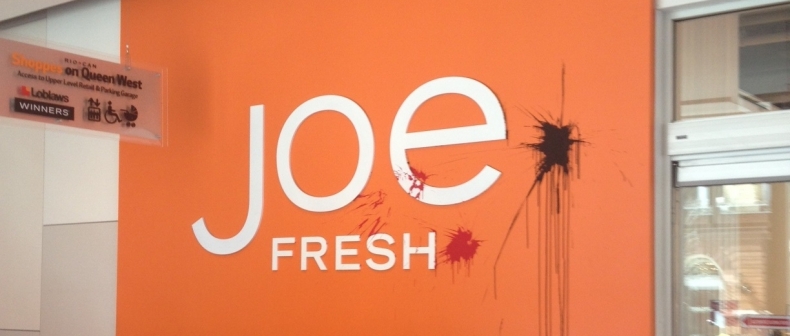
Almost more fun than shopping itself is the popular group activity ‘Look what I bought!’ Your friends, filled with expectation, watch as you pull your newly acquired garment out of the shopping bag, distressing its perfect folds for the first time. It will never look so pristine again, but no matter–it’s yours now. Perhaps you even run to the washroom and put it on. If you’re me, you saunter around the room, staging a one-man fashion show and expect oohs and awws from your friends-slash-spectators. Unobserved fashion is not worth wearing.
I went through this routine this week after visiting the newly opened Drake General Store on Yonge Street. I bought a Canadian-made t-shirt with the famous Hudson Bay stripes. We have a Hudson Bay blanket at my cottage and on misty mornings it’s my favourite thing to curl up in. For a t-shirt it definitely wasn’t cheap, but it fit perfectly and the history nerd in me enjoyed the stylistic wink to the corporation that had a large role in creating this country (even if The Bay is now owned by an American company).
The fashion show over, I relaxed my modeling face, slumped on the couch, and asked my friends about the issue on my mind all day.
“How do we feel about Joe Fresh and Bangladesh?”
There was a pause.
“I’m still going to shop there,” someone finally said.
Last fall, when I wrote about the Tazreen Fashion factory fire in Dhaka that killed more than 100 people, I hoped the tragedy would be a wakeup call for the globalized garment industry. Sadly, the fire has been upstaged by the collapse of the Rana Plaza factory in Savar that killed more than 400 workers. Although an engineer drew attention to the factory’s cracked walls the day before its collapse, owner Sohel Rana saw no need shut down operation.
“This is not a crack,” he said according to a local newspaper. “The plaster on the wall is broken, nothing more. It is not a problem.”
A mass Muslim burial was held for the bodies too mangled and battered to be identified. The Toronto Star reports 149 people are still missing. The list of the dead will continue to grow.
So far, there are two silver linings to this catastrophe. Rana, by all accounts a shady figure who’s tied up with the drug trade and travels with his own motorcycle gang, was swiftly arrested and his assets seized. Labour activists are calling for his execution. But as the New York Times points out, “if Mr. Rana has been vilified, he is partly a creation of the garment era in Bangladesh, during which global businesses have arrived in search of cheap labor to keep profits high and costs low. Directly or indirectly, international brands are now sometimes interlinked with men like Mr. Rana, and placed at risk by them.”
Which leads to the second bright side. Due to the sheer number of international brands linked to Rana Plaza, and that Bangladesh was already on people’s minds after the fire, a handful of companies have seen fit to act.
One of those is Loblaw, which contracts 47 factories in Bangladesh to make clothes for its fashion chain Joe Fresh. At a press conference held yesterday, CEO Galen Weston and Joe Fresh founder Joe Mimran said the company had no plans to leave Bangladesh, but instead would now monitor the structural integrity of the buildings where their products are made.
“Properly inspected, well-built, well-run factories play an important role in the development of countries like Bangladesh,” Mimran said. “The apparel industry is at the forefront of every developing country.”
As British retailer Primark has done, Loblaw promised to set up a compensation fund for the victims and their families.
“What role does industry play in propagating a manufacturing culture that would take such risks with people’s lives?” Weston asked. “I’m also troubled by the deafening silence from other apparel retailers on this issue. As many as thirty international brands were having goods manufactured in this building yet only two have come forward to speak publicly.”
While you could argue that spin was a tad self-serving (pointing out that other companies have done nothing gives Loblaw the moral high ground), Weston is right to shame brands that think they can ignore the tragedy until it goes away. Benetton, for example, first denied having ties to Rana Plaza until labour groups found their labels in the rubble. They have since admitted to a one-time order, but claim they have since severed ties with Rana. Maybe Benetton, so famous for their controversial advertisements, could use a background of rubble in their next ad campaign.
All in all, the executives of Loblaw did the right thing but the problem is larger than Weston, Joe Fresh or even Sohel Rana. As various fashion journalists have pointed out, a shirt shouldn’t cost four dollars. If it does, someone else is paying for it somewhere along the line. But cheap, disposable fashion is like Pandora’s closet–once you open it, how can you go back?
When I brought the issue up to my friends, it surprised me how complacent they were.
“The decision on how globalization would work was made long before us,” my friend said. “My buying or not buying one item of clothing is not going to stop Third World factory owners from doing whatever they can to increase profits.”
“You know how ‘Made in China’ used to be the shameful label to avoid?” another friend asked me. “What’s interesting is Chinese factories are getting better as their standard of living increases. There are much cheaper places to have your products made nowadays.”
Not to sound like a Marxist, but my friend’s point made me wonder if inhumane labour practices are inherent to the capitalist system. If the ultimate goal is to make money, it makes sense to increase profits any way you can, daggling on the precipice of human rights abuse and disaster for as long as you get away with it. Would the British Empire and United States be what they are (or were) without colonial exploitation and slavery? The legacy of the Hudson Bay Company may have been quite different if a responsible independent body supervised its fur traders’ interactions with the First Nations.
Just as organizers did after New York’s Triangle Shirtwaist fire 100 years ago, I hope that the embattled Bangladeshi labour movement is able to harness the outcry into lasting reforms to protect workers’ safety. If companies like Loblaw keep their commitment and are actually able to encourage the building and maintenance of safer factories around the world, then that, more than the employment of low wage workers, would make me proud to be a Canadian.
____
Max Mosher writes about style for Toronto Standard. You can follow him on Twitter at @max_mosher_.
For more, follow us on Twitter @TorontoStandard or subscribe to our newsletter.














